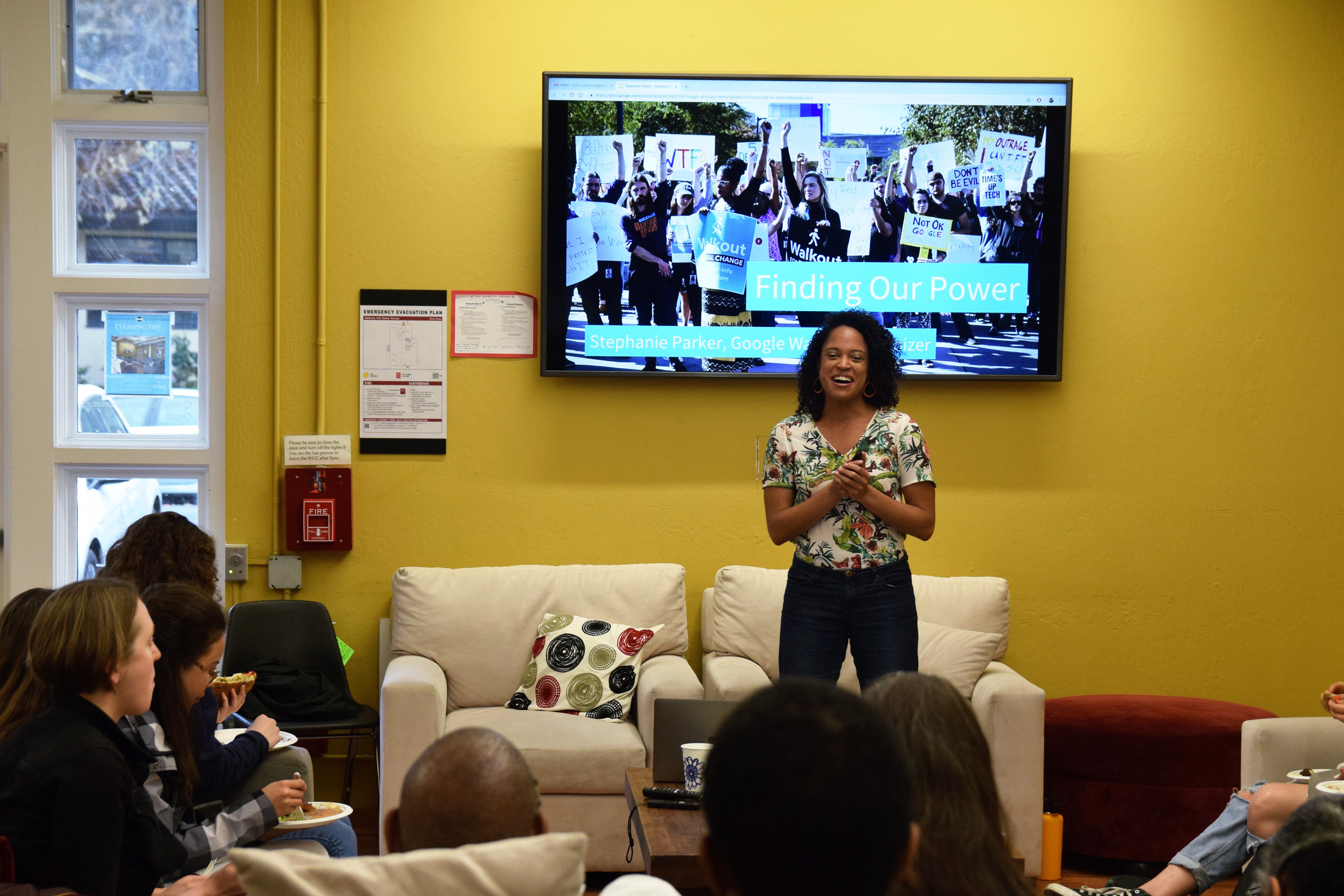Stephanie Parker ’11, a co-organizer of the Google Walkout, spoke at the Women’s Community Center on Monday about the walkout, her story and strategies for activism. Over 20,000 Google employees across 50 cities participated in the walkout, which took place Nov. 1, 2018 and aimed to raise awareness about sexual harassment, discrimination and other issues at Google and in tech companies around the world.
Parker, who works on the Trust & Safety team at Youtube and leads the Black @ Youtube Employee Resource Group, points to Google’s handling of allegations of sexual harassment against former head of Android Andy Rubin as the final impetus for the walkout. Rubin was allegedly paid $90 million to leave the company quietly following the credible claims.
“It was
The co-organizers of the walkout released a statement detailing their demands, which included a commitment to equal pay, a publicly disclosed sexual harassment transparency report and a uniform process for reporting sexual misconduct.
“All employees and contract workers across the company deserve to be safe,” the co-organizers wrote. “Sadly, the executive team has demonstrated through their lack of meaningful action that our safety is not a priority. We’ve waited for leadership to fix these problems, but have come to this conclusion: no one is going to do it for us. We demand an end to the sexual harassment, discrimination and the systemic racism that fuel this destructive culture.”
Parker criticized Google leadership for a lack of responsiveness to employee concerns.
“Before the walkout ….We had gone through all of the normal channels they had told us to,” she said. “We had submitted reports to HR. We had complained to our managers. But no meaningful action was taken on any of these serious issues. In fact, all we got in exchange for raising these serious issues and concerns was further harassment, retaliation and false promises.”
Parker and other activists then decided that the only way to make change at the company would be through collective action, a strategy that had worked at Google in the past. Parker pointed to examples of past activism that she believes paved the way for the walkout.
For example, Google did not renew its contract with the Department of Defense for Project Maven, a controversial drone AI imagine program, after backlash from employees. Similarly, Google has put on hold Project Dragonfly, a censored search engine for users in China, in response to employee concern.
“It’s been a difficult time here.” said Google CEO Sundar Pichai in response to the walkout. “There’s been anger and frustration within the company. We all feel it. I feel it too. At Google we set a very high bar, and we clearly didn’t live up to our expectations.”
Pichai promised concrete steps to address the concerns raised by the walkout but hesitated to say that Google has a toxic culture.
Parker also spoke about her own journey to Google as an African-American woman. After graduating from Stanford with both a bachelors and a masters degrees and several years of experience working in the tech industry, she was surprised that a Google recruiter encouraged her to only apply for an entry-level contractor job. After securing a different job at YouTube, she realized that many other black women at the company shared similar experiences.
“We experience pay inequity, we get pushed into contract roles,” she said. “When we do get in, we get promoted at slower rates. That’s because we get performance reviews with biased feedback telling us that we are, you can guess it, ‘too aggressive,’ ‘too abrasive,’ ‘can’t get along with others.’”
Parker criticized companies like Google that claim to have low numbers of minorities due to a lack of available talent. Google Vice President and Chief Diversity Officer Danielle Brown said in January that Google adopted a new strategy aiming to grow the representation of women globally and of black and Latinx employees in the US to “reach or exceed available talent pools in all levels.
“When I hear that, I think about my own experience and how I was ready and willing to get one of these jobs. I think about all of the black women I’ve met at Google who were ready and willing and talented and qualified but are relegated to roles underneath them.”
Parker emphasized the importance of focusing on systematic racism rather than buzzwords like “diversity and inclusion.”
“What if we focused on the fact that somebody benefits from systemic racism? If we do not focus on the reality that racism is profitable for somebody, then it is no wonder that we are in this situation.”
Parker asked the audience what they would change about Stanford if they had the chance.
Student responses included more diversity among faculty, affordable housing for staff and better channels for reporting abuse, issues which Parker said were identical to those present at Google. She encouraged students to be willing to be disruptive in order to make change.
“The issues we experience are all the same. If we want justice we are going to have to be at least a little disobedient.”
Contact Sophie Regan at sregan20 ‘at’ stanford.edu.
